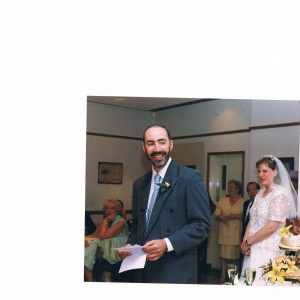
by Michael | Dec 29, 2015 | Blog
Weddings and public speaking go together. And not everybody likes the idea of speaking in public.
In fact, statistics indicate that many people fear delivering a speech more than they fear death!
The likelihood is that most people will be called upon to write and deliver a speech at least some time in their life. It may be for a business presentation or else for a family event. It may be in front of a handful of people or before a whole crowd. However, it is a skill that is well worth mastering.
I recently wrote about how to make a groom’s speech, and this provoked some interest. So here is some general advice that may be useful.

My story
Only a few years ago, I needed persuasion before I would enter a room to network. When I had to give a 10-15 minute presentation about my business in front of 18 people, I was so nervous that I gestured wildly and shattered a glass of water. I became memorable, if not for the right reasons!
Now, I willingly and confidently address small crowds (I haven’t got to the 1000s stage, but that thought doesn’t phase me). Indeed, as a civil celebrant, my success depends, at least in part, on my presentation skills.
I’d therefore like to pass on knowledge and tips that I have acquired, so that the potential ordeal of public speaking can become much more palatable.
Focus
I am going to concentrate here on wedding/vow renewal-type ceremonies. Essentially, we need to focus on content and delivery. Having already focussed on content, I only need to add a little to that now.
Tips
- It is better to be brief than over-long – your audience may be hot, tired, hungry
- If you can deliver humour successfully, do so; if not, keep those jokes to a minimum!
- Avoid too many “in-references” – at a wedding half the guests may not know anything about one of the newly-weds, so in-jokes can fall very flat – and exclude whole groups
- Use a script (only very accomplished, experienced speakers can deliver off the cuff), but rehearse so that you can deliver your speech with only occasional reference to your notes. Eye contact with your audience is very important, if you are to engage with them
- There may be a good sound system, but ensure you can be heard loudly and clearly – you can help that by not burying your head in your notes and by speaking s-l-o-w-l-y ( a lot slower than you may expect!)
- Avoid saying anything controversial, whether about personalities present or about sex, religion or politics – the idea of the proceedings is to create a wonderful atmosphere, not to score points!
- Use anecdotes, but ones that fit in and are relevant. Avoid meandering ‘shaggy dog’ stories that may lose your audience. If you are not good at crafting a good story, maybe you can get someone to help you
- Delivery can be varied (both in terms of speed and of volume), but err on the side of slowness and do not be afraid of a silence, if appropriate. Try not to address one area of the room only, but make everyone feel included
Remember that it is a privilege to be asked to give a speech, so be grateful. Remember your audience at all times. Oh, and, however nervous you may be, save the alcohol for afterwards!
Enjoy the occasion.
by Michael | Dec 21, 2015 | Blog
One of the highlights of a wedding reception is – or should be! – the speeches.
A wedding speech is normally offered by the father of the bride, the best man and the groom.
The father’s speech
Although he may well have financed much, or all, of the event, the bride’s father will only be expected to make a short speech. He may make some (flattering!) reference to the groom and his family, but his job is really to thank everyone for coming and to invite them to have a wonderful time.
The Best Man’s speech
The Best Man has unparalleled knowledge of the groom, and will normally use it to great advantage. He will relate (hopefully!) funny anecdotes that indicate some character traits that not everybody may realise – or, even better, that they do all recognise! The speech should last between about five and ten minutes, depending.
The Best Man (and all speech-makers) should steer clear of politics, insults, bad language and religion.
The Groom’s speech
Just as one hopes the Best Man’s speech will shed light on the groom in a witty and entertaining manner, so the Groom has his chance to talk about his new wife. He will also want to thank people who have made the day possible (including the guests), but he will probably want to demonstrate his affection and express his emotions in some way.
Elements
It is vital that the speech is not too long. Ten minutes should be quite enough. It should focus on the bride – what she means to him, possibly how bride and groom met and maybe an anecdote that shows why he chose her. Vitally, it should be sincere.
Of course, the Groom needs to thank everyone who contributed to the wedding (not just financially!). So it will be the parents of the bride, the participants (bridesmaids, ushers, etc.) and the guests. Absent friends may be mentioned here. Without overdoing it, a bit about the Best Man could go in (preferably, including a story about something he and the Groom both got up to once).
Delivery
It’s unwise to rely on memory (especially on such a day), but reading out from a long script can be boring. The Groom should refer to notes, and try and keep eye contact with his audience as much as possible.
However, when talking about his new wife, what attracted him, why he loves her, recounting an interesting/humorous episode together, the Groom can address his remarks directly to her. A compliment is unlikely to be taken amiss (and the guests will love it too!).
It’s important to try and vary delivery, so it is not monotonous.
Speed
A good tip, however much nerves may be jangling, the Groom should take his time, and avoid mumbling or gabbling. He should speak loudly and clearly. People will really want to hear what he has to say, so it’s not good to frustrate and deprive them!
Humour
Starting with a joke is fine. However, the joke must be funny – and not crude or offensive. Rather than telling lame jokes, it may be better to leave them out altogether.
If the groom is determined to tell a joke, it should be directed gently at the best man (NOT at the new in-laws, unless it is definitely appropriate and they will be OK with it! Starting a marriage off on the wrong foot is not advisable…).
I took a great risk at my wedding, because I chose to be quite rude about my new wife. I got away with it (although I am still suffering the fall-out to this day!) because my comments were funny (no, really!), but it’s a dangerous game to play.
Finish
When the Groom has done what he set out to achieve, he should stop while he’s ahead. He can propose a toast to the bridesmaids and/or his wife and then pass the microphone to his Best Man.
Notes to Grooms
- Don’t forget to thank your in-laws if they financed the affair. Thank your father-in-law for his speech (and for producing such a wonderful daughter). Thank everybody on behalf of your wife too. Make mention of guests from afar, or special guests, your in-laws and your own parents. Don’t thank the caterers, florists etc. who have been paid for their services. Try not to spend too long thanking people. However, feel free to thank your celebrant!
- Don’t read out long lists.
- Resist the temptation to get blind drunk before your speech!
- Check beforehand with your Best Man that there’s no clash or excessive overlap/repetition in what you are both going to say in your speeches.
Prepare thoroughly beforehand, remember the tips about delivery, and you will give a wonderful speech that you will enjoy making and your guests will love hearing.
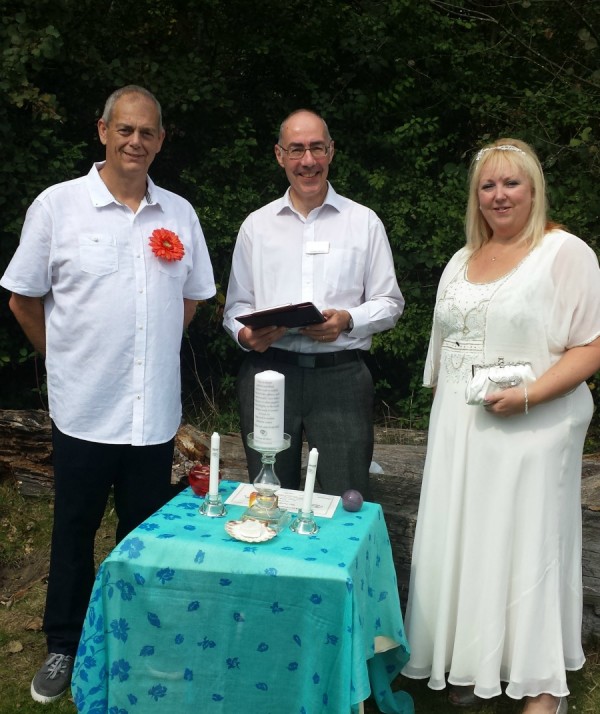
by Michael | Dec 21, 2015 | Blog
We like – and need – rites of passage. These include baptism, confirmation,weddings, 21st birthdays, and (less popular!) death. They may also include Vow Renewals.
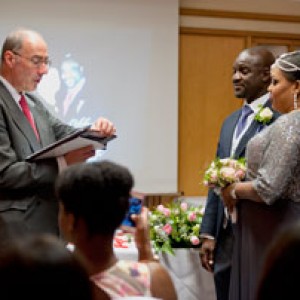
Vow renewals can seem irrelevant to you, unless you’re approaching a significant date or know of someone else who is. So what is the point of them?
Why consider a Vow Renewal?
- You’ve got through a whole year of marriage. You’ve learned how to share, compromise and live together. Well done! Why not mark this achievement in some way?
- You’ve managed five, ten, fifteen or twenty (you get the picture!) years together. Now that’s a real achievement! You could certainly recognise that in company with your friends and relatives.
- Maybe your marriage has been rocky, but you’ve come out on the other side, and you want to re-commit publicly.
- Maybe you married abroad, and would like to share the occasion with your friends over here.
- Perhaps you have acquired a whole new set of friends and even relatives since marrying.
- Maybe the vows you took have become irrelevant and need reformulating and restating.
- You might even simply be looking for an excuse for a celebration!
These are just some reasons to consider having a public ceremony, or Vow Renewal.
Advantages
You can have your ceremony wherever you choose (of course, you may need to get permission, etc., in the normal way).
You can invite whoever you want and as many people as your budget allows.
You can include whatever you wish in the ceremony – readings, ritual, music, readers, etc. Your civil celebrant can advise and guide you. (Note that you will have the final say)
The tone of the ceremony (light-hearted, formal, etc.) is up to you.
You can include whatever elements matter to you – eg ring blessing, rewritten vows, handfasting, for example.
It needn’t be an expensive ceremony: at a basic level, you will need to pay for the venue (if you’re booking one), the civil celebrant, refreshments (if you’re having any), maybe a new set of clothes, and not much else.
Examples
I have officiated at venues as different as a Mayfair hotel and a Canal Centre. The Shard has been suggested as a venue, as has Waterloo Bridge and even at sea on the Queen Elizabeth. For a handfasting vow renewal, the inner circle at Stonehenge is an option. The world is your oyster!
If you can think of anybody who might appreciate a ceremony of this kind, I’d love to give them some help and guidance.
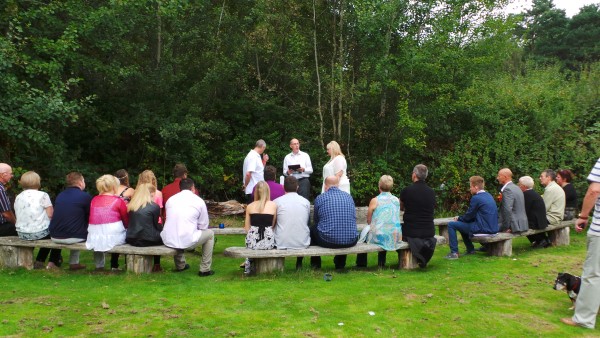
by Michael | Dec 16, 2015 | Blog
Now you’ve decided to consider a vow renewal, how can you save money on it?
The good news about vow renewals is that they tend to be a lot cheaper than weddings! However, nobody wants to spend more than they need to, so here are some suggestions that can lighten the load.
Venue
If you opt for a building or place of worship, you’ll find you’re in competition with people looking for a wedding venue. That means that the need to book early – and prices – will reflect the demand. What about holding the ceremony in your garden? It will take some time and effort to clean it up and prepare it, and a little imagination and expense to decorate it, but it could work very well. (Remember to warn the neighbours, though!)
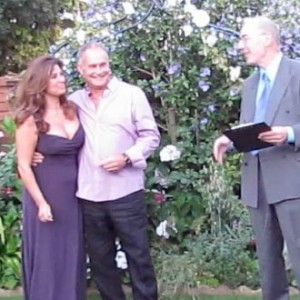
You might be able to hold your ceremony in a public place like a park – but you may still need permission from the landowner (and there may well be a charge).
Clothing
If you still have the clothes you were married in, why not wheel them out again? You may have changed shape a bit in the intervening years, so do try them on well beforehand. A tailor’s alterations may save you a lot compared to buying a new outfit.
If you do want to buy from new, you may be able to find suitable attire at a good price online, or wait for sales’ season.
There’s nothing to stop you from having a casual ‘do’, so you can use clothes already in your wardrobe.
You could always compromise by buying a couple of items – shoes for her, and a tie for him, say.
Photographer
I always advocate a professional photographer for a wedding, and the same applies for a vow renewal. However, you can often get a cheaper rate, if you find a photographer just starting out. You might be able to enquire from a nearby college whether there are any photography students that they could recommend for you.
You can advertise, of course, although this can add quite a bit to your costs. Craigslist is seen by many photographers.
Food
There’s much to be said for professional caterers, but they do add a lot on to the price. A sit-down meal is complex as well as dear, but, provided you have places to sit, a buffet will work really well. If preparing it yourself, you could ask family and friends to bring a dish. You might be able to buy from wholesale cash and carries, if you’re buying in bulk, and save money that way.
Note that fruit and vegetables that are in season are likely to be cheaper.
Final thought
I haven’t mentioned the civil celebrant, but their ceremonies usually cost a lot less than weddings.
Using this advice, you should be able to plan a lovely ceremony without too much work or expense. As you would with a wedding, make sure you and your partner are in agreement about all the arrangements!
Enjoy!
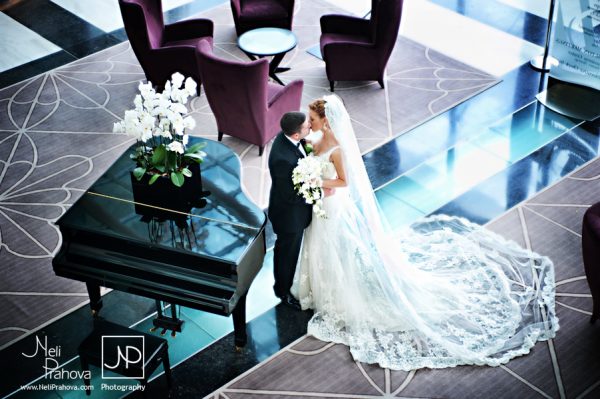
by Michael | Dec 15, 2015 | Blog
Did you know the following six marriage facts?
- For centuries, marriage was considered a means for improving your wealth or status. A well-chosen marriage could preserve your power, gain you land and produce heirs for you. Love had nothing to do with it (until around the 17th century). In fact, love was often seen as an obstacle to an “advantageous” marriage. It only became at all common for people to marry for love from the late 18th That was because, after the Industrial Revolution, people could earn enough money to afford to go against their parents’ choice of spouse.
- The first known marriages (as in documented events) date back to around 2,000 BC, in Mesopotamia (modern-day Iraq).
- Wearing a white dress on your wedding day only became popular in the West in the mid-1800s, after Queen Victoria wore white to marry Prince Albert. This tradition is not universal, however, as it is common for the bride to wear red in countries such as India and China, because that is considered to be a lucky colour.
- Some 5,000 weddings a year take place in Gretna Green. This is a Scottish village, just over the border from England, which became popular for runaway weddings after a 1753 Act made marriage in England and Wales more regulated. Consequently, people started to go north, where the rules were much freer.Nowadays, Gretna Green is more of a romantic notion, but still highly popular.
- The longest marriage on record is that between Daniel and Susan Bakeman, who were married in New York City in 1772, and stayed together over 91 years.
- Apparently, more than a third of marriages these days begin online. Studies suggest that online couples tend to have longer, arguably happier, marriages.
Who’d have thought it?
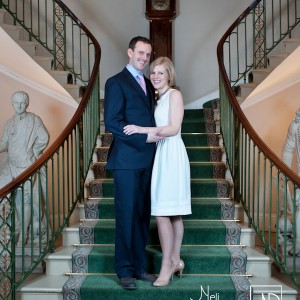
by Michael | Dec 15, 2015 | Blog
Of course you are looking for the wedding of your dreams.

Every wedding is different. I can offer hints that will make almost any wedding better, but there is no one-size-fits-all solution. However, I think that some of these suggestions ought to help you with your wedding, whatever your vision may be.
The “Correct” Wedding
There is no such thing as a “correct” wedding.
Like many, you may go down the formal religious route, if that’s what you want. (Please note: I am not saying “if that’s what your parents want”, which is a whole different – though valid – issue!)
If you’re happy with the non-religious, but formulaic register office ceremony, then, of course, that’s fine too.
However, before deciding, bear in mind that you should celebrate your wedding in the way that makes sense to you (both). You need to follow your instincts. You can be creative. You can be yourself.
You don’t need to believe in God to have a ceremony that is sincere, inviting, personal to you, that will delight not only you both, but your family and friends.
With the help of your civil celebrant, you can create a ceremony that honours different cultures and traditions in a way that unites rather than divides.
Planning
Ideally, if your family is financing the affair, they should not dictate their beliefs or wishes on your big day. Please note that I am saying “YOUR big day”. If your parents can let go, there won’t be all that tension, and you’ll be free to have fun and enjoyment throughout the event.
The groom should be a part of the planning process. After all, if you are sharing a whole-life vision, why ignore such an important, significant occasion? The groom should certainly be given a chance to offer input (hopefully, he will not consider himself ‘superior’, nor should he be considered not worth consulting).
Perfection
If you demand perfection, you probably won’t enjoy the day (or lead-up). Of course, you can aim at a wonderful event and employ relevant, trusted professionals to help achieve that. But the goal of the wedding is that people will remember your wedding five, even ten, years on with a warm glow.
Follow these simple guidelines, and your wedding day should become a great deal more beautiful, memorable, stress-free and successful!








